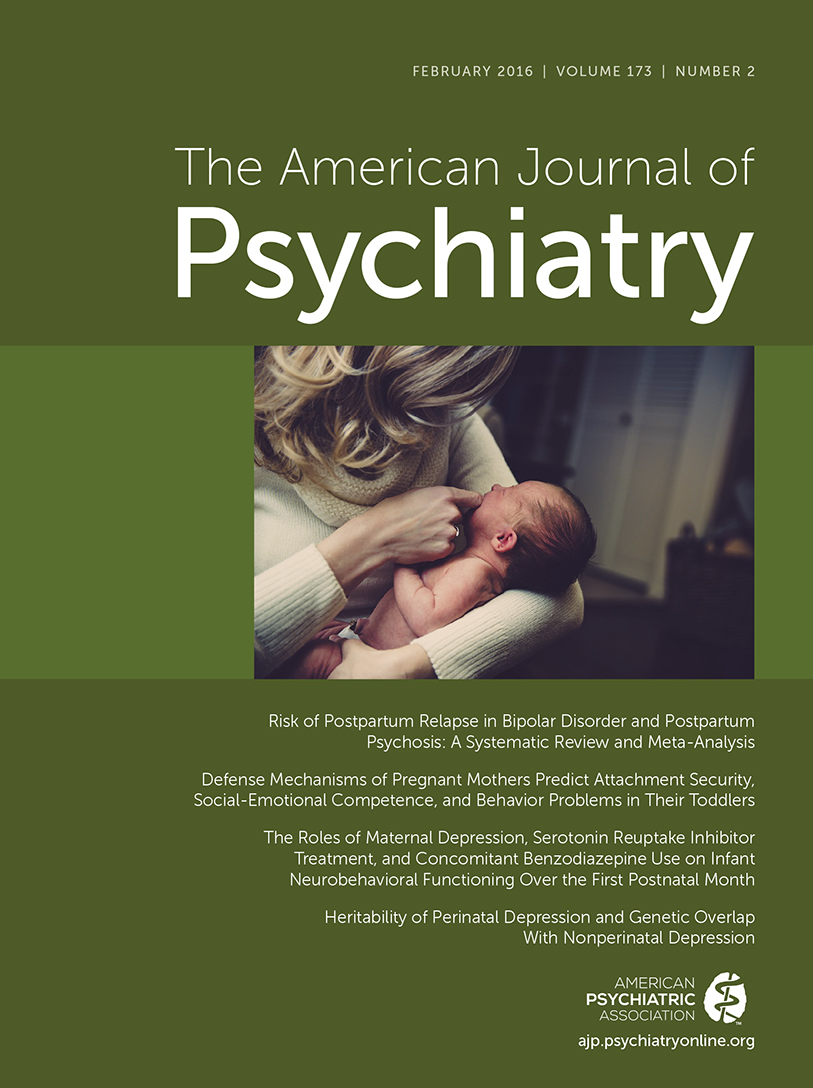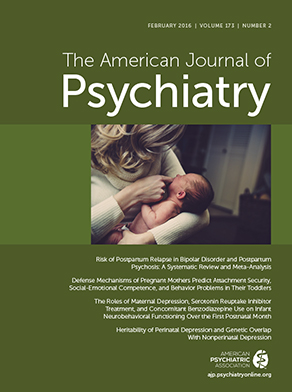Systematic Review and Meta-Analysis: Dose-Response Relationship of Selective Serotonin Reuptake Inhibitors in Major Depressive Disorder
Abstract
Objective:
Method:
Results:
Conclusions:
Method
Search Strategy and Study Selection
Data Extraction
Data Analysis
Results
Included Studies
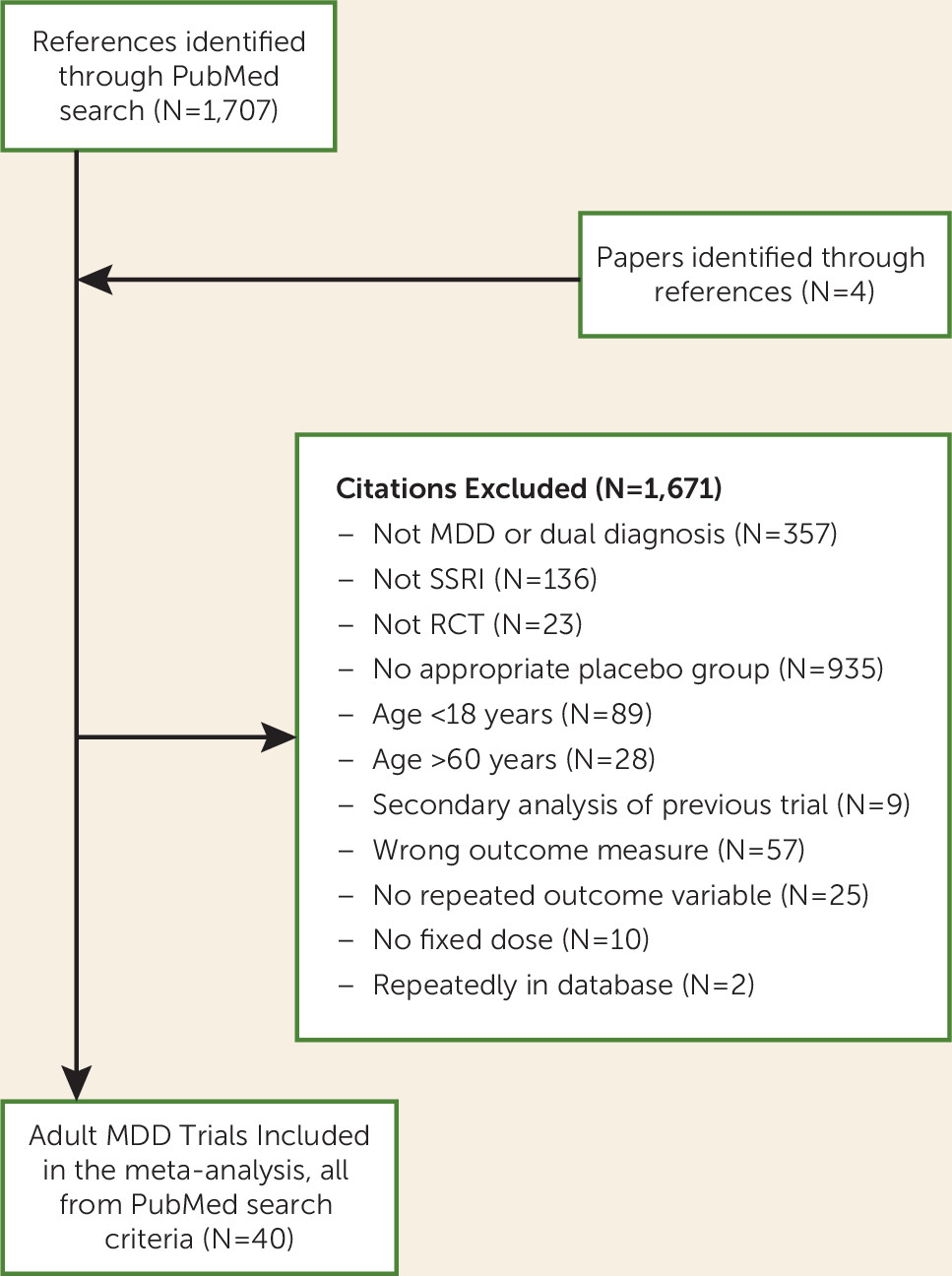
SSRI Efficacy
Best-fitting model of SSRI response.
Dose-response curve in continuous model of SSRI response.
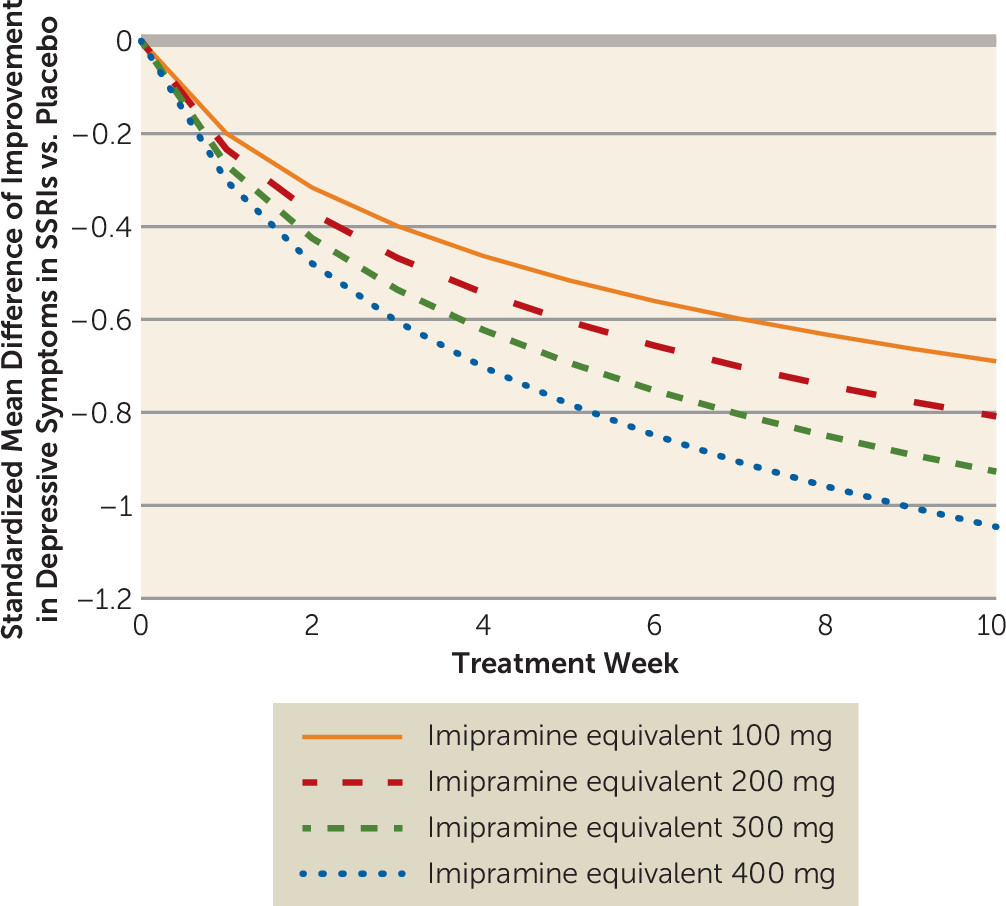
Traditional meta-analysis examining depression severity.
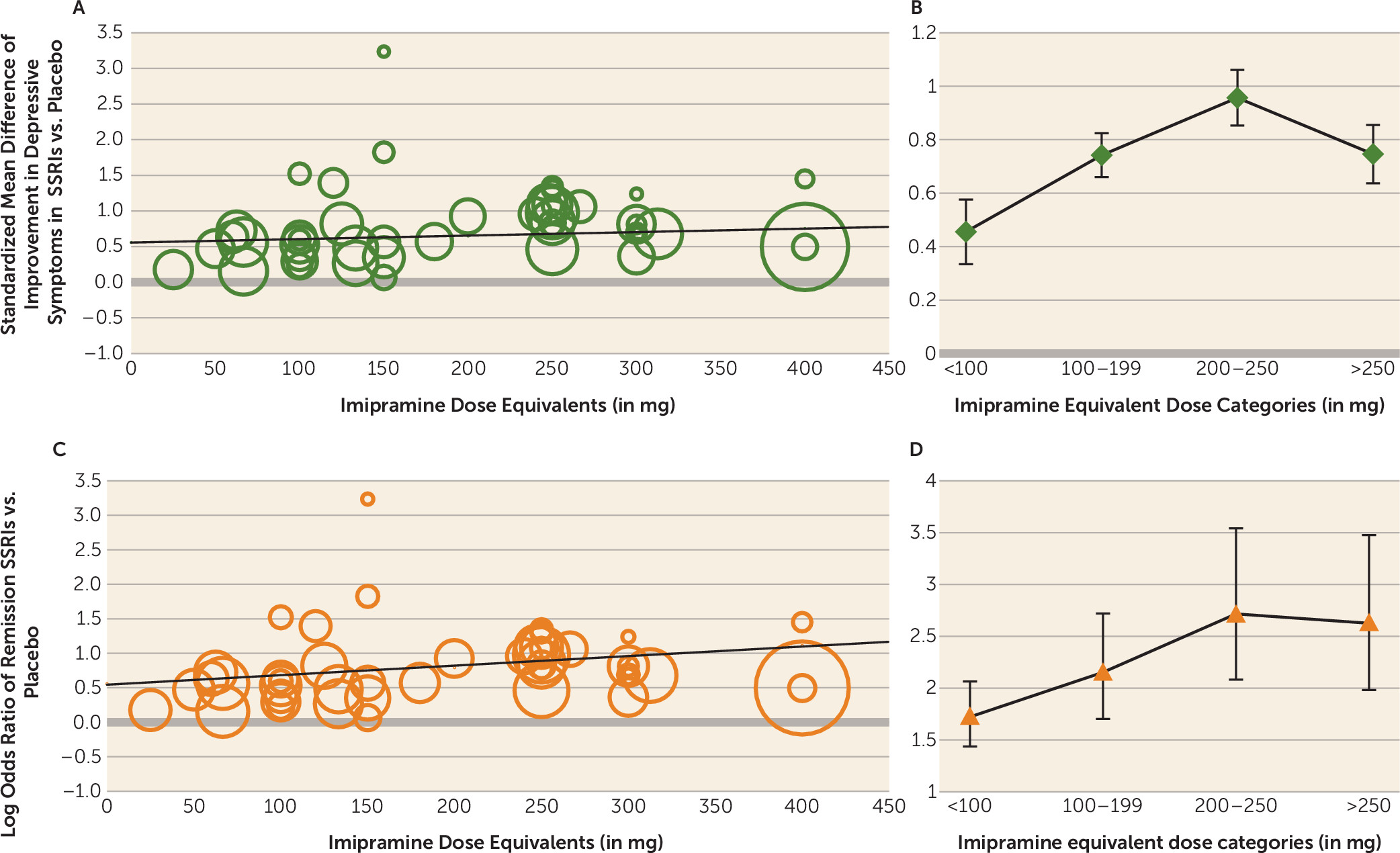
Traditional meta-analysis examining treatment response.
SSRI Tolerability
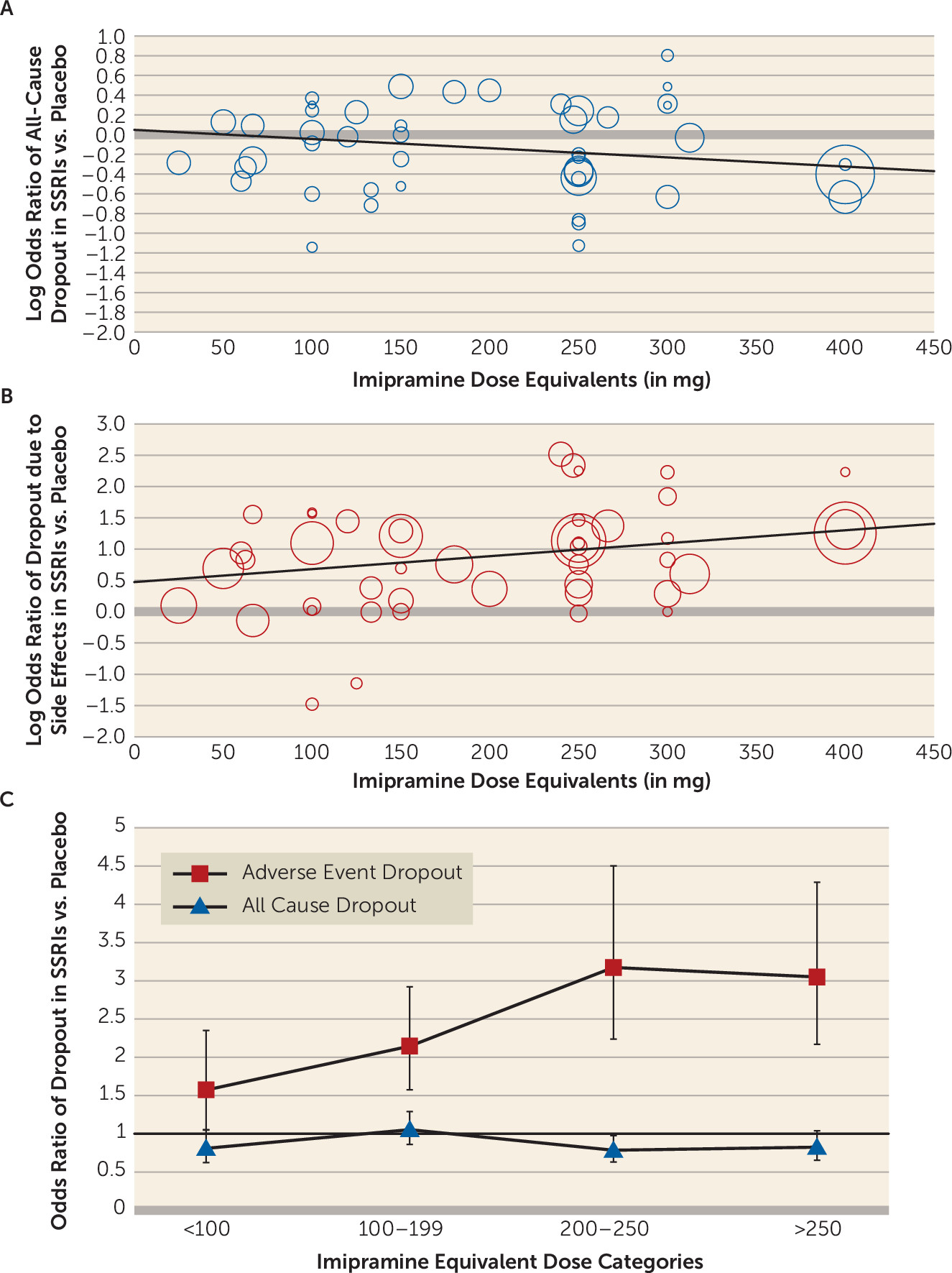
Discussion
| Dose Category (and Daily Dosage) | Placebo | Subtherapeutic SSRI | Low-Dose SSRI | |||
|---|---|---|---|---|---|---|
| Odds Ratio | 95% CI | Odds Ratio | 95% CI | Odds Ratio | 95% CI | |
| Actual odds ratio of treatment response | ||||||
| Subtherapeutic (<100 mg) | 1.72 | 1.44–2.07 | ||||
| Low-dose (100 mg–199 mg) | 2.02 | 1.69–2.41 | 1.17 | 0.98–1.40 | ||
| Medium dose (200 mg–250 mg) | 2.72 | 2.08–3.54 | 1.58 | 1.17–2.06 | 1.35 | 1.00–1.70 |
| High dose (>250 mg) | 2.65 | 2.22–3.17 | 1.54 | 1.29–1.84 | 1.31 | 1.07–1.52 |
| Estimated odds ratio based on effect size | ||||||
| Subtherapeutic (<100 mg) | 2.23 | 1.91–2.62 | ||||
| Low-dose (100 mg–199 mg) | 3.16 | 2.76–3.62 | 1.42 | 1.24–1.62 | ||
| Medium dose (200 mg–250 mg) | 5.07 | 4.34–5.91 | 2.27 | 1.95–2.65 | 1.60 | 1.37–1.87 |
| High dose (>250 mg) | 3.06 | 2.65–3.52 | 1.37 | 1.18–1.58 | 0.97 | 0.84–1.11 |
| N | Range | N | Range | N | Range | |
| Actual number needed to treat of treatment response | ||||||
| Subtherapeutic (<100 mg) | 8 | 6–11 | ||||
| Low-dose (100 mg–199 mg) | 6 | 5–8 | 27 | 12–∞ | ||
| Medium dose (200 mg–250 mg) | 4 | 3–6 | 9 | 6–27 | 14 | 8–∞ |
| High dose (>250 mg) | 4 | 4–5 | 10 | 7–17 | 16 | 10–64 |
| Estimated number needed to treat based on effect size | ||||||
| Subtherapeutic (<100 mg) | 5 | 4–6 | ||||
| Low-dose (100 mg–199 mg) | 4 | 3–4 | 12 | 9–20 | ||
| Medium dose (200 mg–250 mg) | 3 | 2–3 | 5 | 4–6 | 9 | 7–13 |
| High dose (>250 mg) | 4 | 3–4 | 13 | 9–26 | No Benefit* | |
| Odds Ratio | 95% CI | Odds Ratio | 95% CI | Odds Ratio | 95% CI | |
| Actual odds ratio of dropout due to side effects | ||||||
| Subtherapeutic (<100 mg) | 1.56 | 1.08–2.25 | ||||
| Low-dose (100 mg–199 mg) | 2.22 | 1.68–2.94 | 1.42 | 1.08–1.88 | ||
| Medium dose (200 mg–250 mg) | 3.16 | 2.32–4.32 | 2.02 | 1.49–2.77 | 1.42 | 1.04–1.95 |
| High dose (>250 mg) | 3.08 | 2.29–4.14 | 1.97 | 1.47–2.65 | 1.39 | 1.03–1.86 |
| Actual odds ratio of all-cause dropout | ||||||
| Subtherapeutic (<100 mg) | 0.82 | 0.67–1.01 | ||||
| Low-dose (100 mg–199 mg) | 1.09 | 0.92–1.29 | 1.33 | 1.12–1.57 | ||
| Medium dose (200 mg–250 mg) | 0.80 | 0.68–0.95 | 0.98 | 0.83–1.16 | 0.73 | 0.62–0.87 |
| High dose (>250 mg) | 0.75 | 0.64–0.87 | 0.91 | 0.78–1.07 | 0.69 | 0.59–0.80 |
| N | Range | N | Range | N | Range | |
| Actual number needed to harm of dropout due to side effects | ||||||
| Subtherapeutic (<100 mg) | 34 | 16–230 | ||||
| Low-dose (100 mg–199 mg) | 16 | 10–28 | 45 | 22–230 | ||
| Medium dose (200 mg–250 mg) | 10 | 7–15 | 19 | 11–38 | 45 | 20–459 |
| High dose (>250 mg) | 10 | 7–15 | 20 | 12–40 | 48 | 22–611 |
Acknowledgments
Supplementary Material
- View/Download
- 632.19 KB
References
Information & Authors
Information
Published In
History
Authors
Funding Information
Metrics & Citations
Metrics
Citations
Export Citations
If you have the appropriate software installed, you can download article citation data to the citation manager of your choice. Simply select your manager software from the list below and click Download.
For more information or tips please see 'Downloading to a citation manager' in the Help menu.
View Options
View options
PDF/EPUB
View PDF/EPUBLogin options
Already a subscriber? Access your subscription through your login credentials or your institution for full access to this article.
Personal login Institutional Login Open Athens loginNot a subscriber?
PsychiatryOnline subscription options offer access to the DSM-5-TR® library, books, journals, CME, and patient resources. This all-in-one virtual library provides psychiatrists and mental health professionals with key resources for diagnosis, treatment, research, and professional development.
Need more help? PsychiatryOnline Customer Service may be reached by emailing PsychiatryOnline@psych.org or by calling 800-368-5777 (in the U.S.) or 703-907-7322 (outside the U.S.).
